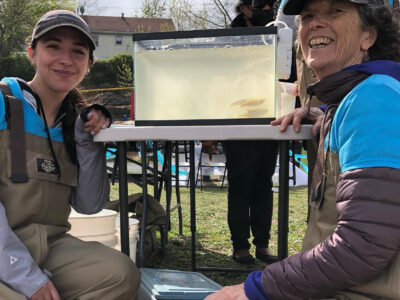Columbia Water Center’s PepsiCo Foundation funded project to reduce groundwater use in Punjab, India, is currently in a very active phase. After working with over 500 farmers last year to conduct a field experiment on the use of tensiometers to reduce irrigation in rice fields, this year they will be working with about 5,000. As part of this expansion, our program partners at the Punjab Agricultural University (PAU) are working with Cooperative Societies, a network of which reaches some 3,000 villages in the state.
Our partners are regularly meeting with about 60 farmers at each Cooperative Society they visit in the Amritsar, Jalandhar, Ludhiana, Moga, and Patiala districts, as many as 5 visits per day, where they share information and build interest – basically generating buzz about the opportunity.

“In the next stage,” says Dr. Rajinder Sidhu, a professor and dean at PAU, “we will hold large Farmer Camps, consisting of around 200 – 300 farmers, where we will deliver expert lectures and enroll farmers who will use tensiometers on their farms.

“The summer,” he adds, “is very hot – touching 44 degrees Celsius – and the visits are highly taxing, but we are committed to meeting the target of 5,000 farmers. It will be possible with the help of the Administration of Cooperatives Department.”
Based on the first year of the tensiometer experiment, the researchers estimate that participating farmers used about 22% less water than those not participating. If just 40 percent of the area under rice cultivation in Punjab were to adopt tensiometer use, it would save an estimated 3 million dollars in energy per year, and 22 billion cubic meters of water.
Dr. Sidhu also met with the Financial Commissioner of Cooperatives, who previously served as an electric power official. Sidhu is interested in strengthening that relationship in order to support collaboration on the implementation of alternative power-pricing strategies.
Another aspect of the Pujab project involves contract agreements with farmers that encourage them to grow crops that require less water than rice, such as various types of vegetables. Dr. Sidhu reports, “There is one more dimension of Cooperative Societies, which is quite exciting for our project. Very recently the Cooperative Societies Administration helped develop and register a Cooperative Society in Jalandhar, which has started a business strengthening the supply chain for perishables. They have leased Ludhiana Modern Pack House from the Punjab Mandi Board for 10 years, and have started supplying fruits and vegetables after doing the grading, cooling, ripening in their pack house. They procure these fruits and vegetables directly from the farmers. In next few days, they will start selling the vegetables and fruits directly to the consumers through their own carts. Their volume of business is quite high and they have started earning profits. They are also trying for GAP (Good Agricultural Practices) certification. This is exactly what we intend in our project, as it directly involves the farmers with back-end support. This is a real model being implemented through cooperatives, which has great potential for being replicated very easily.”
–
Columbia Water Center demonstrates research-based solutions to global freshwater scarcity and climate-related water-risks. Follow Columbia Water Center on Facebook and Twitter.




Good job of Pepsi co. & PAU for waters conservation in agricultural sector .
But my request is that water conservation to other sectors also cover like domestic water & industrial water .
Build Common STP in rural areas
Treated water again used in horticulture or domestic water
Sludge used as a manure in farm
It is Realy good that companies like Pepsi co are coming forward in developing India’s water resources.
Its good that a country known as gods own country is been helped by big companies for development..
And thanks @Julia Apland Hitz for this wonderful post..
This is really great when big companies such as PepsiCo take part in saving resources. I hope that they will continue their work and this will help people of India.